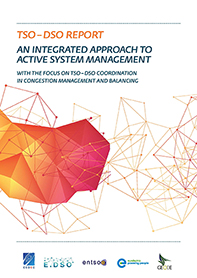
The European associations representing the distribution system operators (DSOs) – CEDEC, E.DSO for Smart Grids, Eurelectric and GEODE - as well as ENTSO-E, representing the transmission system operators (TSOs), launch a report on the development and integration of new flexibility services in the electricity system and market. These services could support system operators to manage congestions in their grids caused by increased electrification and shares of decentralised resources. Since the same resources can also be used by TSOs, the interaction between congestion management and balancing is discussed in the report. Therefore, TSOs and DSOs propose a vision in their common report “An integrated approach to Active System Management”.
Why did TSOs and DSOs work on Active System Management (ASM)?
The TSO-DSO Data Management report from 2016 concluded that it is necessary for TSOs and DSOs to agree on mutual processes and data exchanges to guarantee the reliable, efficient and affordable operation of the electricity system and grid, and to secure non-discriminatory and efficient markets.
Furthermore, the recently adopted Clean Energy Package (in Article 32.1 of the Electricity Directive) gives the possibility for DSOs to procure flexibility services, including for congestion management, in their service area.
As a consequence, in 2017 European TSO and DSO associations decided to focus on the use of flexibility for grid and system purposes, as well as on the interaction of different market processes.
What is ASM?
ASM is a key set of strategies and tools performed and used by DSOs and TSOs for the cost-efficient and secure management of the electricity system and grid. It entails the use of flexibility for congestion management, balancing and their coordination when needed by involving market parties. It encompasses the operational processes, the necessary information and data exchange, as well as the interaction with market parties.
The integrated electricity system approach recognises and respects the roles and responsibilities of TSOs and DSOs as system operators and neutral market facilitators. The level playing field for market parties is crucial to foster and value flexibility services.
The objective of the report is to share views and to increase mutual understanding by identifying core questions and outlining possible solutions on ASM. It also elaborates on the principles and guidelines for congestion management and its interaction with balancing and aims at a market-based approach.
On 16th April, the five associations convened an event to release the report that they drafted together, with the support of the European Commission and the useful dialogue with stakeholders.

 ENTSO-E
ENTSO-E